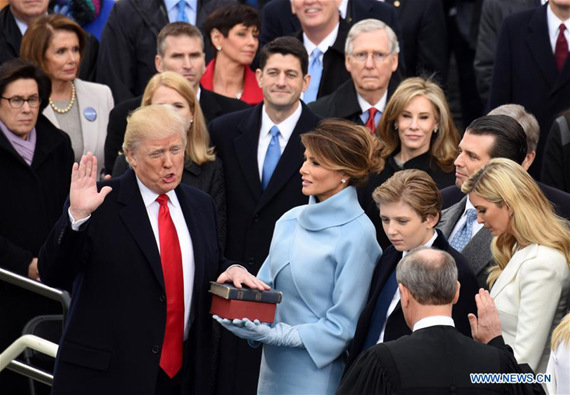
U.S. President Donald Trump(L) takes the oath of office during the presidential inauguration ceremony at the U.S. Capitol in Washington D.C., the United States, on Jan. 20, 2017. Donald Trump was sworn in on Friday as the 45th President of the United States. (Xinhua/Yin Bogu)
Shortly after new U.S. President Donald Trump was inaugurated, the White House website published the America First Energy Plan, which has aggravated the anxiety and criticism concerning where Trump will lead the country to.
The shift in energy policies, as seen in the website change of deleting these issues about climate change and claiming to embrace the shale oil and gas revolution, didn't come from nowhere. During his presidential campaign, Trump had blamed climate change as a "hoax," and threatened to withdraw from the Paris Agreement on climate change. Observers worldwide are watching with uneasiness whether the biggest developed country in the world will backslide on climate change or not.
If so, "all countries stand to lose," "most of all the U.S.," cautioned Rob Bailey, a research director on energy, environment and resources with the London-based think tank Chatham House.
He elaborated that while the United States is expected to take a more protectionist approach to trade, it is possible that other countries might impose tariffs on American imports to adjust for the lower emissions costs of U.S. exporters.
Moreover, American prosperity will not be served by its economy remaining shackled to fossil fuels while the rest of the world has already transited away from them, Bailey noted.
Nicholas Stern, Chairman of the British Grantham Research Institute on Climate Change and the Environment, was quoted by the Guardian newspaper as advising Trump: "If you want to make America great again, building modern, clean and smart infrastructure makes tremendous commercial and national sense."
"There is no long-term, high-carbon growth story, because destruction of the environment would reverse growth," he added.
Dame Julia King, an official adviser to the British government at the Committee on Climate Change, echoed.
In King's opinion, if Trump wants to deliver greater job security for Americans, he should focus on clean and sustainable industries where the United States has a competitive advantage and are set to prosper.
"He needs to build an economy for 2050, not one for 1950," said the official adviser.
According to Richard Black, director of the Energy and Climate Intelligence Unit, a non-governmental organization, the changing economics of energy systems can't be reversed, just as public appetite for clean air and cool things like electric cars can't be wished away.
In a responsive statement, America's Sierra Club Executive Director Michael Brune referred to Trump's energy policies as "a polluter wishlist that will make our air and water dirtier, our climate and international relations more unstable, and our kids sicker," adding that this is "a shameful and dark start to Trump's Presidency, and a slap in the face to any American who thought Trump might pursue the national interest."
Barbara Finamore, Asia director of the Natural Resources Defense Council, a U.S.-based environmental advocacy group, wrote in a recent blog: "Trump has given every sign that he would rather move backward, into our unsustainable past, than move forward-alongside China and other signatories to the Paris climate agreement-into the sustainable future."
Deborah Seligsohn, an expert on China's climate and energy policies at the University of California San Diego, told Xinhua, "Obviously the U.S. partners in the world need to be prepared to speak up for what they believe is necessary and to press the U.S. to meet its commitments," highlighting the fact that both the energy secretary and the EPA (U.S. Environmental Protection Agency) administrator nominated by Trump stand in opposition to constructive climate action.


















































